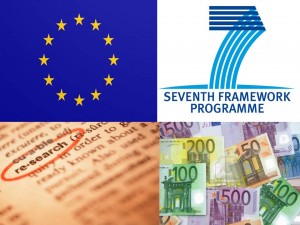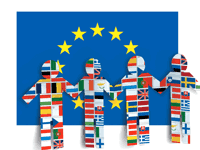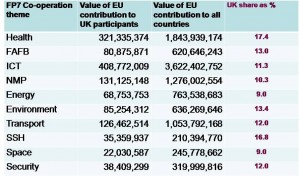 A new hub of information for those affected by cancer has just been launched, providing an open-access, integrated approach to providing the whole cancer community with high-quality and trustworthy information. The product of two years’ work as part of the ‘Establishing an efficient network for cancer communication in Europe’) project, which was boosted by more than EUR 1.2 million of funding under the ‘Science in Society’ Theme of the Seventh Framework Programme (FP7), ‘ecancerHub‘ brings together information from major European cancer organisations in one easy-to-use site. The 2-year long EUROCANCERCOMS project was made up of 18 project partners from Belgium, Greece, Italy, the Netherlands, Romania, Spain, Sweden, Switzerland and the United Kingdom. By establishing an integrated EU model for a Europe-wide cancer information and policy exchange portal, the pan-European team have succeeded in their aim of creating a functional exchange system for accurate information and intelligence.
A new hub of information for those affected by cancer has just been launched, providing an open-access, integrated approach to providing the whole cancer community with high-quality and trustworthy information. The product of two years’ work as part of the ‘Establishing an efficient network for cancer communication in Europe’) project, which was boosted by more than EUR 1.2 million of funding under the ‘Science in Society’ Theme of the Seventh Framework Programme (FP7), ‘ecancerHub‘ brings together information from major European cancer organisations in one easy-to-use site. The 2-year long EUROCANCERCOMS project was made up of 18 project partners from Belgium, Greece, Italy, the Netherlands, Romania, Spain, Sweden, Switzerland and the United Kingdom. By establishing an integrated EU model for a Europe-wide cancer information and policy exchange portal, the pan-European team have succeeded in their aim of creating a functional exchange system for accurate information and intelligence.
Tagged / FP7
We’ve summarised the EU FP7 Work Programmes for you!
 As you will be aware the FP7 Calls for Proposals were released on July 20th. FP7 is the major Programme for European funding with a budget of €7 billion for this year, so plenty of funds to dip into!
As you will be aware the FP7 Calls for Proposals were released on July 20th. FP7 is the major Programme for European funding with a budget of €7 billion for this year, so plenty of funds to dip into!
The European Commission releases its Calls for Proposals in some rather long documents (196 pages in some cases) known as ‘Work Programmes’.
The RDU know you are all pushed for time in your research endeavours and that the Work Programmes make for very dull reading, so we have been working day and night to summarise all of the calls for you in easy to access PDF formats under different types of funding and different subject areas. This way, you can scan the opportunities faster and take a look at the aim and eligibility criteria more easily to see if you can apply.
These summaries along with a full outline of what FP7 is, how to find funders etc are all available at our staff-only access webpage on EU Funding.
How to get SMEs involved in your research
FP7 funding is increasingly preoccupied with involving SMEs in projects. If you’re thinking of applying for funding and wondering how best to involve SME’s you can look through the  report from the commission which provides an analysis of their involvement in funded projects.
report from the commission which provides an analysis of their involvement in funded projects.
Find EU Partners for the Lifelong Learning Programme, Ethics in Security or Health
 Attending Information days and workshops held by the European Commission not only gives you a great opportunity to find out more about a call and ask any questions about it, but these events are also critical networking opportunities to meet others interested in building a consortium and applying for funding. An info day on the Lifelong Learning Programme will be held in October and a workshop on Ethical issues in Security Research in September. If you are interested in applying to either of these calls, you should attend the info day.
Attending Information days and workshops held by the European Commission not only gives you a great opportunity to find out more about a call and ask any questions about it, but these events are also critical networking opportunities to meet others interested in building a consortium and applying for funding. An info day on the Lifelong Learning Programme will be held in October and a workshop on Ethical issues in Security Research in September. If you are interested in applying to either of these calls, you should attend the info day.
To help find partners in Health funding, the details of participants who attended the recent partnering day on the 2012 Health Theme calls in Brussels are now available. A search page has been created where it is possible to look for participants of the recent partnering event by area of the work programme, type of organisation, country or through a free search. If you are planning on being involved in a proposal for the 2012 calls for the FP7 Co-operation Health Theme, then you should join look at this search page Health partnering day search page
How difficult is getting FP7 funding? Not too hard for some UK and EU fraudsters!
 Nature has reported that the European Anti-Fraud Office are currently in the process of prosecuting project consortia who received EU grants for fake research projects. The fraud was committed by a number of beneficiaries who appear to have made up entire research projects, including whole research teams, fictitious companies and subcontractors, and won EU grants for these projects. It appears that the projects were designed solely to obtain the funds and that no actual research activity was carried out.
Nature has reported that the European Anti-Fraud Office are currently in the process of prosecuting project consortia who received EU grants for fake research projects. The fraud was committed by a number of beneficiaries who appear to have made up entire research projects, including whole research teams, fictitious companies and subcontractors, and won EU grants for these projects. It appears that the projects were designed solely to obtain the funds and that no actual research activity was carried out.
Four collaborative projects under in the ICT area were terminated by the European Commission, and several individuals were charged for the fraud. Further projects are currently being investigated in the UK, France, Greece, Austria, Sweden, Slovenia and Poland.
It should be stressed that this is a very rare and unusual example of fraud in EU grants, especially when it comes to research grants, and it seems it is never possible to completely prevent fraud, even with the already very strict and robust systems in place for the Framework Programme. Overall, there continues to be a lot of support for simplification of the EU funding programmes including for greater acceptance of own (nationally approved) accounting systems, clarity and consistency.
How to find partners for EU Projects
 European Commission projects usually require partners, with the number and geographical location varying for each call. A useful tip to remember when considering your partner options is that a consortium should include a good balance of sectors industry, academia, user groups etc) and that all partners should be well-matched to the activities in the proposal.
European Commission projects usually require partners, with the number and geographical location varying for each call. A useful tip to remember when considering your partner options is that a consortium should include a good balance of sectors industry, academia, user groups etc) and that all partners should be well-matched to the activities in the proposal.
You can find partners through your existing contacts, by reviewing previously awarded FP6 and FP7 projects, by searching/ advertising on the UKRO website ,
by seeking the assistance of the relevant UK National Contact Point and by attending EU conferences and project evaluations, by scanning the CORDIS website.
The best and most effective way to become involved in FP7 consortia however, is to join European Technology Platforms (ETPs). These are groups of industry-led stakeholder forums who explore Europe’s key challenges. ETPs define the EU Strategic research agenda and then bid for European Commission funds (through FP7 etc) to address these. The biggest players in the field across Europe belong to these groups and obviously as they set the research agenda, they are increduibly successful at winning FP7 funds for research. Joining these groups will not only open you to a plethora of partners but also will allow you to contribute in shaping the research agenda of Europe (which you can then address through funding). Some of the major ETPs are listed below with hyperlinks to their webpages:
Advanced Engineering Materials and Technologies
Advisory Council for Aeronautics Research in Europe
Embedded Computing Systems
European Biofuels Technology Platform
European Construction Technology Platform
European Nanoelectronics Initiative Advisory Council
European Rail Research Advisory Council
European Road Transport Research Advisory Council
European Space Technology Platform
European Steel Technology Platform
European Technology Platform for the Electricity Networks of the Future
European Technology Platform for Wind Energy
European Technology Platform on Smart Systems Integration
European Technology Platform on Sustainable Mineral Resources
Farm Animal Breeding and Reproduction Technology Platform
Food for Life
Forest based sector Technology Platform
Future Manufacturing Technologies
Future Textiles and Clothing
Global Animal Health
Industrial Safety ETP
Integral Satcom Initiative
Mobile and Wireless Communications
Nanotechnologies for Medical Applications
Networked and Electronic Media
Networked European Software and Services Initiative
Photonics21
Photovoltaics
Plants for the Future
Robotics
Sustainable Nuclear Technology Platform
Sustainable Chemistry
Water Supply and Sanitation Technology Platform
Waterborne ETP
Zero Emission Fossil Fuel Power Plants
FP7 Cooperation Theme: what subjects are covered?
 The Cooperation theme is divided into 11 different topics; clicking on the hyperlink below will display the focus of the calls covered under each of these.
The Cooperation theme is divided into 11 different topics; clicking on the hyperlink below will display the focus of the calls covered under each of these.
Health
Food, Agriculture, Fisheries and Biotechnology
Energy
ICT (Computing)
NMP(Nanosciences)
Socio-Economic Sciences & Humanities
Transport
Security
Space
Joint Technology Initiatives (JTI)
Public-Private Partnerships
FP7 Security 2012 Call update and slides from Info Day available!
 The FP7 Security Call will be published on 20 July 2011 and new features to be included in the 2012 Work Programme are:
The FP7 Security Call will be published on 20 July 2011 and new features to be included in the 2012 Work Programme are:
- a new aspect of the 2012 Security Work Programme is the inclusion of pilot funding for Pre Operational Validation;
- an open topic for SMEs has been included in the 2012 Work Programme: SEC.2012.7.2-1 “Advancing contemporary laboratory forensic methods & equipment”. Under this topic at least 50% of the EC funding needs to go to SMEs;
- assistance in finding partners for FP7 Security proposals will be available on-line at the Partnering Platform website, operated (and quality controlled) by the German National Contact Point.
Slides are available from an ICT Security Info Day which was held at Aston University Business School last week.
EU funding: not as hard as you might think to win
 The UK as a whole does pretty well when it comes to obtaining EU funding. We receive the second largest share of FP7 funding; €2.28 billion (equivalent to 14.4% of the total FP7 funding) and we are involved in more successful projects than France and Germany (41.0% of all grant agreements in FP7). As you can see from this table, the UK has obtained a great deal of funding from the FP7 Cooperation fund.
The UK as a whole does pretty well when it comes to obtaining EU funding. We receive the second largest share of FP7 funding; €2.28 billion (equivalent to 14.4% of the total FP7 funding) and we are involved in more successful projects than France and Germany (41.0% of all grant agreements in FP7). As you can see from this table, the UK has obtained a great deal of funding from the FP7 Cooperation fund. 
Over the next few months, I will be posting tips on how to find funding, how to write proposals, find partners etc. to help you to begin to explore the EU as a good source of funding.
ChinaAccess4EU funding available
 ChinaAccess4EU project is funded by FP7, aiming to increase the awareness and dissemination in the EU of access opportunities for European researchers and research organisations in Chinese national research and innovation programmes. There is a series of newly published calls under the themes Strategic Public Policy Research; Collaborative Research; and Health Care and Promotion.
ChinaAccess4EU project is funded by FP7, aiming to increase the awareness and dissemination in the EU of access opportunities for European researchers and research organisations in Chinese national research and innovation programmes. There is a series of newly published calls under the themes Strategic Public Policy Research; Collaborative Research; and Health Care and Promotion.
AHRC survey on International Collaboration
 The AHRC is currently carrying out a survey to gather vital information about International collaborations in order gain a greater understanding. The 10 minute survey provides an opportunity to inform the AHRC of your experience in International collaboration and feed into the on-going development of the AHRC’s international activities- including FP7 participation. The deadline for submission is 10th July 2011.
The AHRC is currently carrying out a survey to gather vital information about International collaborations in order gain a greater understanding. The 10 minute survey provides an opportunity to inform the AHRC of your experience in International collaboration and feed into the on-going development of the AHRC’s international activities- including FP7 participation. The deadline for submission is 10th July 2011.
Catalogue of EU Funded Projects in Environmental Research 2007-11 published
 This catalogue presents information on 337 projects selected for funding under the ‘Environment (including climate change)’ theme of FP7.
This catalogue presents information on 337 projects selected for funding under the ‘Environment (including climate change)’ theme of FP7.
BU on the EU stage
 Recent research conducted by a team in the School of Applied Sciences (ApSci) has highlighted the need for a collaborative, interdisciplinary approach to environmental management and policy development. It is a project which is well placed in BU’s movement towards research focused on societal themes and aims to establish how stakeholder values of their local environment can be used to improve the effectiveness of ecosystem management creating stronger links between citizens and policy makers.
Recent research conducted by a team in the School of Applied Sciences (ApSci) has highlighted the need for a collaborative, interdisciplinary approach to environmental management and policy development. It is a project which is well placed in BU’s movement towards research focused on societal themes and aims to establish how stakeholder values of their local environment can be used to improve the effectiveness of ecosystem management creating stronger links between citizens and policy makers.
This European collaboration is nearing completion. The Transactional Environmental Support System Project (TESS), supported by the 7th Framework Programme of the European Commission was coordinated by Aristotle University of Thessaloniki (www.tess-project.eu) and involved several ApSci staff. The rationale for this project had its foundations in the move towards citizen-driven environmental governance and policy development. The aim of TESS was to provide a platform through which biodiversity information collected at a local level can be incorporated into policy development and land-use management. Could a system of this type encourage local communities to have more involvement in collection of these important data, and a greater role in the maintenance and restoration of their local environment and ecosystem services?
The project involved partnership with 14 other institutions from 10 different European countries. The project identified what information is required by both local land users and policy makers in order to develop effective environmental policy which will benefit both biodiversity and economic development. The results were tested through 11 local case studies which were then used to further develop the TESS portal (due to go online in the next month or so). BU’s involvement with the project has allowed us to develop strong, collaborative relationships with a number of institutions across Europe, linking strongly with the University’s desire to become more active on the European stage.
During the project, the ApSci team, including Prof. Adrian Newton, Dr. Kathy Hodder, Lorretta Perrella, Jennifer Birch, Elena Cantarello, Sarah Douglas, James Robins and Chris Moody, carried out a local case study within Dorset’s Frome Catchment Area. This case study site falls within the Dorset AONB and includes a SSSI, Local Nature Reserves, National Nature Reserves and Special Areas of Conservation. We were able to incorporate local knowledge and opinion into a novel evaluation of the ecosystem services and biodiversity benefits that might be realised through implementation of SW Biodiversity Implementation Plan. Such strategies have the implicit assumption that working on a landscape-scale to develop ‘ecological networks’ should have potential to facilitate adaption to climate change, increase ecological ‘resilience’ and improve the UK’s ability to conform to international policy commitments, such as the Habitat Directive. However, it is accepted that the cost of the ecological restoration required for such initiatives could be substantial and little work has been conducted on cost-benefit analysis of restoration initiatives. The work carried out by BU for the TESS project addressed the knowledge gap surrounding the cost effectiveness of ecological restoration approaches to climate change adaptation.
We currently have a paper in review with the Journal of Applied Ecology based on this work. It shows that spatial Multi Criteria Analysis could be used to identify important ecological restoration zones based on a range of criteria, including those relating to ecosystem services, biodiversity and incorporating the values of a range of stakeholders. This tool could be of direct value to the development of ecological networks in the UK as a climate change adaptation measure. Such tools developed through TESS may enable future plans for ecological restoration to incorporate local stakeholder values, improving the chances of societal benefits and long-term success of the schemes.
The wider results of the TESS project were presented at a conference in May 2011, hosted by the European Parliament Intergroup at the European Parliament in Brussels. BU was represented at the conference by one of our postdoctoral researches, Emma McKinley.

FP7 Smart Cities info being broadcast live today!
 A reminder that the Smart Cities Initiative launch event, today the 21 June 2011, will be broadcast online. At a later stage, this initiative may evolve into a European Innovation Partnership (EIP). Topics on Smart Cities are expected to be included in the 2012 Work Programme in the FP7 Co-operation Energy Theme, which is expected to be published on 20 July 2011. Those who are interested in applying for future ‘Smart Cities and Communities’ calls for proposals might wish to check the participant list for possible project partners.
A reminder that the Smart Cities Initiative launch event, today the 21 June 2011, will be broadcast online. At a later stage, this initiative may evolve into a European Innovation Partnership (EIP). Topics on Smart Cities are expected to be included in the 2012 Work Programme in the FP7 Co-operation Energy Theme, which is expected to be published on 20 July 2011. Those who are interested in applying for future ‘Smart Cities and Communities’ calls for proposals might wish to check the participant list for possible project partners.
Another Marie Curie success story
 Three Marie Curie calls are currently open, and following our blogpost by Rudy Gozlan on how to successfully win a Marie Curie grant, we also wanted to highlight Prof Bogdan Gabrys (DEC) success through this scheme.
Three Marie Curie calls are currently open, and following our blogpost by Rudy Gozlan on how to successfully win a Marie Curie grant, we also wanted to highlight Prof Bogdan Gabrys (DEC) success through this scheme.
 Bogdan is coordinating the INFER project involving 25 academics from organisations in three different countries. INFER stands for Computational Intelligence Platform for Evolving and Robust Predictive Systems and is a project funded by the European Commission within the Marie Curie Industry and Academia Partnerships & Pathways (IAPP) programme, with a runtime from July 2010 until June 2014.
Bogdan is coordinating the INFER project involving 25 academics from organisations in three different countries. INFER stands for Computational Intelligence Platform for Evolving and Robust Predictive Systems and is a project funded by the European Commission within the Marie Curie Industry and Academia Partnerships & Pathways (IAPP) programme, with a runtime from July 2010 until June 2014.
Want to gain a Marie Curie Fellowship? Our 4-times winner shares his experience
 Three EC Marie Curie calls are currently open and having successful won a whopping fourMarie Curie fellowship awards, BU’s Professor Rudy Gozlan (ApSci) shares the secret to success:
Three EC Marie Curie calls are currently open and having successful won a whopping fourMarie Curie fellowship awards, BU’s Professor Rudy Gozlan (ApSci) shares the secret to success:
 I secured my first Marie Curie fellow in 2003 and since have repeated it four times with the latest fellow programmed to join Bournemouth University in September 2011 (Polish researcher). What I have noticed in the last few years is a sharp increase in the number of applicants as a result of the level of competition. It is not good enough to have a very good candidate and a very good proposal, you will need to reach excellence in both the candidate and the proposal as only scores above 91% have a real chance of being funded. Having said that, if you secure a fellowship you are guaranteed success during the two years of the fellowship as these candidates need little supervision (they are the elite of Europe after all) and they provide an extremely effective vector for mentoring among your PhD student community. In addition, once they return home they often secure top positions which will help you building an effective network of collaborators for further EU research proposals. So, if you are planning to secure a MCF where do you start?
I secured my first Marie Curie fellow in 2003 and since have repeated it four times with the latest fellow programmed to join Bournemouth University in September 2011 (Polish researcher). What I have noticed in the last few years is a sharp increase in the number of applicants as a result of the level of competition. It is not good enough to have a very good candidate and a very good proposal, you will need to reach excellence in both the candidate and the proposal as only scores above 91% have a real chance of being funded. Having said that, if you secure a fellowship you are guaranteed success during the two years of the fellowship as these candidates need little supervision (they are the elite of Europe after all) and they provide an extremely effective vector for mentoring among your PhD student community. In addition, once they return home they often secure top positions which will help you building an effective network of collaborators for further EU research proposals. So, if you are planning to secure a MCF where do you start?
First, you need to find a successful candidate. They are many ways you could do this, through international conferences when you spot a good talk from a junior researcher, you can approach them and discuss whether they have considered doing a post-doc. Also, you can contact your colleagues in other EU institutions and ask whether they have a good PhD student near completion and offer to develop a collaborative Marie Curie Fellowship (MCF) application, including your colleague in the steering group. Colleagues always like the opportunity to be involved in research excellence and know they would then have a good case for recruiting their student after a two year MCF. However, recruiting the student is only the first step of the process; you now need to develop an excellent proposal. An excellent proposal is not only an excellent scientific case; all categories such as “Impact”, “Training” etc are extremely important. Over the years we have established a template which we improve from year to year (I can provide some of the successful applications if needed). You cannot afford to rushed a single criteria of the application as this will make the difference between being funded (>91%) and failing.
 Finally, these proposals are extremely time consuming so it is not something you decide at the last minute. I generally approach my potential students in December (although I generally have a pretty good idea of who I want) and start drafting the proposal in March. I personally never let the candidates develop their own proposal as I often have a better understanding of what could be funded and what could not. It has, for example, to be within your expertise but it also needs to complement the candidates own expertise while still not being too far away from his/her existing area of research. The proposal needs to appear to provide the candidate with a new set of skills that will become relevant when (s)he returns home and help him/her secure a position. As such the proposal needs to clearly demonstrate how this MCF will bridge this skill gap. It is also important to secure a good supervisory team which will provide a guarantee of research quality and give confidence to the reviewers that the student will be in a leading research environment.
Finally, these proposals are extremely time consuming so it is not something you decide at the last minute. I generally approach my potential students in December (although I generally have a pretty good idea of who I want) and start drafting the proposal in March. I personally never let the candidates develop their own proposal as I often have a better understanding of what could be funded and what could not. It has, for example, to be within your expertise but it also needs to complement the candidates own expertise while still not being too far away from his/her existing area of research. The proposal needs to appear to provide the candidate with a new set of skills that will become relevant when (s)he returns home and help him/her secure a position. As such the proposal needs to clearly demonstrate how this MCF will bridge this skill gap. It is also important to secure a good supervisory team which will provide a guarantee of research quality and give confidence to the reviewers that the student will be in a leading research environment.
Finally, even if you were unsuccessful you shouldn’t ditch your proposal but rather resubmit it the following year with either a new candidate if the candidate received a poor mark (you need to be ruthless) or keep the candidate and carefully address the reviewers’ comments.
Finally, I will bid for another MCF this year with a Portuguese student so if you would like further tips get in touch, otherwise I wish you good luck.
There are currently three MCF calls open – read about them here. If you would like to discuss a possible submission to any of these calls, please contact Corrina Dickson in the Research Development Unit.
Partner Search: Crowberry Consulting
Crowberry Consulting is a female run company based in the North West of England with over 11 years industry experience of delivering sustainability projects. We have previously bid for IEE projects, and have extensive contacts in UK based universities and Turkish Research Institutes. Our academic qualifications include: MBA Environmental Management, MSC Environmental Impact Assessment, BSC Ecology, MA Environmental Consulting, and BSC Biology.
Crowberry Energy is a not for profit social enterprise working with SMEs and large listed companies, to implement carbon management and carbon foot-printing, sustainable development policies, and specific standards such as ISO14001, BS EN 16001, BS8901, and the Carbon Action Standard for UK CRC compliance. We also provide specialist training in the areas of:
- Carbon Foot printing and Carbon Management
- How Green is Your Office
- CSR – Corporate Social Responsibility
For more details about this SME, please click here.
Forthcoming FP7 environment focused conferences
 Enterprise Europe Network South West European Funding for Environmental Projects: to promote the opportunities for European funding in the environmental sector.
Enterprise Europe Network South West European Funding for Environmental Projects: to promote the opportunities for European funding in the environmental sector.
EC FP7 Knowledge-Based Bio-Economy Info Day: an info day for anyone interested in the 2012 call, and the EC will present on the three work programme activities.
FP7 Environmental Brokerage Event & Conference: will focus on the work programme challenge ‘improving resource efficiency’ and coinciding with the Environmental (Bio) Technologies conference on 5th – 8th September.
1st European Gender Summit: will address issues related to new perspectives on research and innovation and has already attracted 45 high-level speakers.











 BU attendance at third annual GCPHR meeting in June
BU attendance at third annual GCPHR meeting in June Interactive Tangible and Intangible Heritage Applications – BU student work featured in new book chapter
Interactive Tangible and Intangible Heritage Applications – BU student work featured in new book chapter Second NIHR MIHERC meeting in Bournemouth this week
Second NIHR MIHERC meeting in Bournemouth this week MSCA Postdoctoral Fellowships 2025 Call
MSCA Postdoctoral Fellowships 2025 Call ERC Advanced Grant 2025 Webinar
ERC Advanced Grant 2025 Webinar Horizon Europe Work Programme 2025 Published
Horizon Europe Work Programme 2025 Published Horizon Europe 2025 Work Programme pre-Published
Horizon Europe 2025 Work Programme pre-Published Update on UKRO services
Update on UKRO services European research project exploring use of ‘virtual twins’ to better manage metabolic associated fatty liver disease
European research project exploring use of ‘virtual twins’ to better manage metabolic associated fatty liver disease